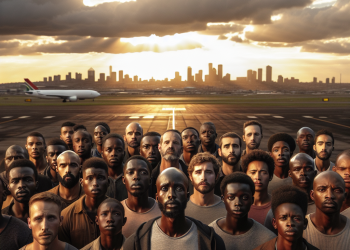An Ethiopian woman identified as Muluwerk has opened up about how she lost her appetite for eating food at a young age. According to her, she hasn’t eaten anything in the last 16 years.
Muluwerk who is based in Addis Ababa, Jimma, told a UK-based YouTuber that besides food, she had also never taken water for over a decade.
She went on to reveal that she was also taken for medical checkups in over three countries abroad including India, Qatar, and Dubai but the doctors discovered she was healthy and normal like any other person.
“I have never eaten in the last 16 years. I lost my appetite at my primary school days.
“About medication, I visited a doctor in Dubai and he found no problem with my stomach, but he questioned my mental status,” Muluwerk said.
The 26-year-old young lady also added that even though she had never eaten in the last 16 years, she does farming, and every time her crops reach harvesting time, she lets her sister do the harvesting.
READ MORE: X Risks Fines As Elon Musk Insists On Violating Court Order
I would let the vegetables grow and when they reach harvest time, I let my mother or sister harvest and eat” the mother of one added.
Living such a life without taking any meals or and visiting the washroom for short calls; Muluwerk said it was just the work of God.
“When I was pregnant with my daughter, doctors gave me glucose to supplement the natural body energy and when I gave birth, she fed on artificial milk. Living such like my life is the work of God.” She added.
However, she said many people are always surprised by her lifestyle, especially church members, but she feels God created her in a unique way to be the Centre of attention from healthy examiners.
How Long Can One Go Without Food?
According to medical experts, our bodies are very resourceful, when one goes without food, the body can obtain energy and fuel from its fat. If needed, it can also use muscle stores.
The following timeline of what happens to your body when you go without food is not exact, but it can give you an idea of what may happen and when.
After 1 Day
The body normally uses glucose, or sugar, as its main source of energy. When one doesn’t eat, your glucose reserves are used up within one day.
After one day without food, the body releases a hormone called glucagon. This hormone tells the liver to make glucose. This glucose is used mostly to feed the brain.
After 2 or 3 Days
After two or three days without food, the body starts to break down fatty tissue. The muscles use the fatty acids created during this process as their main source of fuel.
Fatty acids are also used to form ketones in the liver. Ketones are another substance the body can use for energy. These are released into the bloodstream. When the brain uses them for fuel, it doesn’t need as much glucose.
After 7 Days
When the fatty acid reserves are gone, the body switches to protein. Depending on how little fatty tissue you have, it may take only a few days to reach this point. By one week, however, the bodies of most starving people will be actively breaking down muscle to obtain protein.
After 14 Days
As the breakdown of muscle speeds up, the body begins to lose heart, kidney, and liver function. This is what may ultimately lead to death.
Because a starving body lacks the resources to stay healthy, infection is another possible cause of death.
What Influences Survival Without Food
Sex, age, starting weight and water consumption can all play into how long someone can go without food.
This is based on the limited research on this subject. For obvious ethical reasons, scientists cannot purposefully starve people to study this. Instead, many look at people who chose to starve themselves and were later evaluated by a doctor.
Sex: Females survive longer than males. This is true even in famines.
Age: Children are at higher risk of death during famines.
Starting weight: Research indicates that lean people can usually tolerate a loss of up to 18% of their body mass and will become weak after 30 to 50 days without food. Death usually occurs between 43 and 70 days. By contrast, people who are obese may be able to tolerate more than 20% body mass loss. These timeframes are likely long for them as well.
Water Intake: Generally speaking, people can survive for longer without food if they drink plenty of water.
Complications Of Going Without Food
Unless eating is resumed, starvation always leads to death. Before death, certain complications may occur. The number of body systems affected increases as weight loss increases.
Some of these complications include;
- Bone loss
- Muscle weakness and wasting
- Feeling cold
- Thinning or loss of hair
- Dry skin
- Constipation
- In females, loss of menstruation
- Fatigue, shortness of breath, and paleness from anemia, a lack of oxygen-carrying red blood cells
Upshot
How long human beings can go without food is an open question. Estimates indicate that starving people become weak in 30 to 50 days and die in 43 to 70 days.
Individual factors including sex, age, starting weight, and water intake all play a role in how long someone can live without food.
The body works to fight starvation by producing glucose and breaking down fatty tissue. In later stages, it breaks down muscle. But without food, these efforts will fail and a person will ultimately die.










